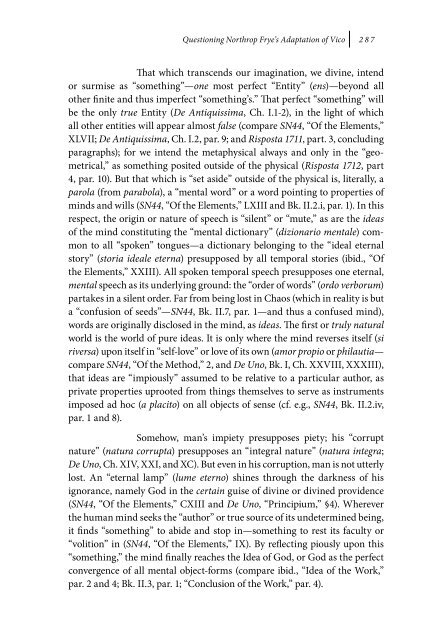Spring 2010 - Interpretation
Spring 2010 - Interpretation
Spring 2010 - Interpretation
You also want an ePaper? Increase the reach of your titles
YUMPU automatically turns print PDFs into web optimized ePapers that Google loves.
Questioning Northrop Frye’s Adaptation of Vico<br />
2 8 7<br />
That which transcends our imagination, we divine, intend<br />
or surmise as “something”—one most perfect “Entity” (ens)—beyond all<br />
other finite and thus imperfect “something’s.” That perfect “something” will<br />
be the only true Entity (De Antiquissima, Ch. I.1-2), in the light of which<br />
all other entities will appear almost false (compare SN44, “Of the Elements,”<br />
XLVII; De Antiquissima, Ch. I.2, par. 9; and Risposta 1711, part. 3, concluding<br />
paragraphs); for we intend the metaphysical always and only in the “geometrical,”<br />
as something posited outside of the physical (Risposta 1712, part<br />
4, par. 10). But that which is “set aside” outside of the physical is, literally, a<br />
parola (from parabola), a “mental word” or a word pointing to properties of<br />
minds and wills (SN44, “Of the Elements,” LXIII and Bk. II.2.i, par. 1). In this<br />
respect, the origin or nature of speech is “silent” or “mute,” as are the ideas<br />
of the mind constituting the “mental dictionary” (dizionario mentale) common<br />
to all “spoken” tongues—a dictionary belonging to the “ideal eternal<br />
story” (storia ideale eterna) presupposed by all temporal stories (ibid., “Of<br />
the Elements,” XXIII). All spoken temporal speech presupposes one eternal,<br />
mental speech as its underlying ground: the “order of words” (ordo verborum)<br />
partakes in a silent order. Far from being lost in Chaos (which in reality is but<br />
a “confusion of seeds”—SN44, Bk. II.7, par. 1—and thus a confused mind),<br />
words are originally disclosed in the mind, as ideas. The first or truly natural<br />
world is the world of pure ideas. It is only where the mind reverses itself (si<br />
riversa) upon itself in “self-love” or love of its own (amor propio or philautia—<br />
compare SN44, “Of the Method,” 2, and De Uno, Bk. I, Ch. XXVIII, XXXIII),<br />
that ideas are “impiously” assumed to be relative to a particular author, as<br />
private properties uprooted from things themselves to serve as instruments<br />
imposed ad hoc (a placito) on all objects of sense (cf. e.g., SN44, Bk. II.2.iv,<br />
par. 1 and 8).<br />
Somehow, man’s impiety presupposes piety; his “corrupt<br />
nature” (natura corrupta) presupposes an “integral nature” (natura integra;<br />
De Uno, Ch. XIV, XXI, and XC). But even in his corruption, man is not utterly<br />
lost. An “eternal lamp” (lume eterno) shines through the darkness of his<br />
ignorance, namely God in the certain guise of divine or divined providence<br />
(SN44, “Of the Elements,” CXIII and De Uno, “Principium,” §4). Wherever<br />
the human mind seeks the “author” or true source of its undetermined being,<br />
it finds “something” to abide and stop in—something to rest its faculty or<br />
“volition” in (SN44, “Of the Elements,” IX). By reflecting piously upon this<br />
“something,” the mind finally reaches the Idea of God, or God as the perfect<br />
convergence of all mental object-forms (compare ibid., “Idea of the Work,”<br />
par. 2 and 4; Bk. II.3, par. 1; “Conclusion of the Work,” par. 4).
















